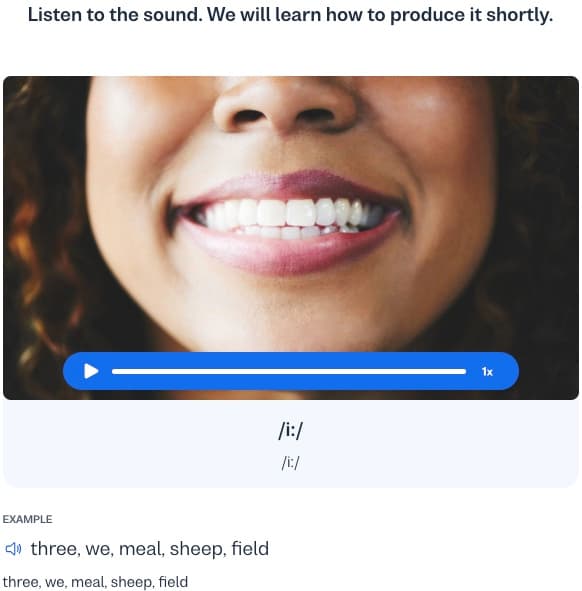I want to learn...
Author:

Barney Meekin
English has a natural rhythm. Some syllables and words are emphasized, and some are shortened with no emphasis. When speakers stress words or syllables, the pitch is higher and the vowel sound is clearer. Unstressed words have a lower pitch, with shorter and weaker vowel sounds. Stress combines with intonation to give English its distinct rhythm.
In this ultimate guide to English words and sentence stress, you’ll learn the rules of stress, how stress can change meaning, and the importance of weak vowel sounds.
What are word stress and sentence stress?
Word stress is when speakers emphasize certain syllables in a word. You can break English words down into syllables — a unit of pronunciation with a vowel sound. If a word has one vowel sound, it has one syllable. If a word has two vowel sounds, it has two syllables. And so on.
Word stress is when one of these syllables has emphasis. The pitch is higher and the vowel sound is clear and pure. Word stress doesn't only change the sound of a word, it can sometimes change the meaning. Let’s look at “record” for example. When the stress is one the first syllable (“RE-cord”) it’s a noun. When the stress is on the second syllable (“re-CORD”) it’s a verb. This means correct stress is important for communication.
Sentence stress is when speakers emphasize certain words within a sentence. Usually, speakers stress the words that have important information. But what’s important changes depending on the context (more on that later). As with word stress, sentence stress has a big effect on meaning. So it’s vital for clear communication.
The importance of weak vowel sounds
Before we move on to the rules of word and sentence stress, we need to talk about weak vowel sounds. They’re a key part of English’s natural rhythm. And understanding them will help your English pronunciation.
When syllables don’t have stress, the vowel sound is weak. This means it’s shorter and less clear with a lower pitch. Let’s look at a simple example of how this works: “the” vs “then.”
In a sentence, “the” usually has no stress but “then” does. Although they look similar, this changes the vowel sound a lot. The e-sound in “then” is pure (like in “bed,” or “pen”) because of the stress. But “the” is not stressed so people don’t use that same e-sound. Instead, it takes a weak vowel and sounds more like “uh.”
This “uh” sound in English is called the schwa — it’s the most common weak vowel sound (if not vowel sound overall). Most unstressed vowels will be this “uh” sound. As you go through the following word stress and sentence stress rules, don’t forget the important weak vowel sounds. Because they’re a key part of English pronunciation.
Word stress rules
To make it easier for you to understand English word stress, let’s go over some of the rules.
1. Two-syllable words
For two-syllable nouns and adjectives, the stress usually goes on the first syllable. For example, “TA-ble,” and “HA-py.”
For two-syllable verbs and prepositions though, the stress usually goes on the second syllable. For example, “ar-RIVE,” and “be-TWEEN.”
Where things get tricky is when words can be both nouns and verbs. For example, “RE-cord” is the noun, and “to re-CORD” is the verb.
That’s not all I’m afraid. As with many things in English, there are exceptions. Let’s look at “desert, and “dessert.” They’re both two-syllable nouns but the stress is different: “DE-sert,” and ‘des-SERT.” And when you use “desert” as a verb, the stress is on the second syllable and it sounds like “dessert.’ I told you it gets tricky.
2. Three-syllable words
Most three-syllable nouns, adjectives, and verbs have stress on the first syllable. For example, “PAR-lia-ment,” “LI-mi-ted,” and “CE-le-brate.”
Three-syllable words ending in “ly” usually have stress on the first syllable. For example, “SI-lent-ly,” “NOIS-i-ly,” “HAP-pi-ly.”
Three-syllable words ending in “cy,” “al,” and “ty,” usually have stress on the second syllable. For example, “preg-NAN-cy,” “fi-NAN-cial,” and “qua-LI-ty,”
Just to make things difficult though, there are exceptions to the rules. “Remember” is a verb with three syllables but the stress comes on the second.
3. Words ending in “ic,” “sion,” and “tion”
Here’s another exception to the rule above: “Perfection” is a three-syllable noun but the stress comes on the second syllable too.
When three or four-syllable words end in “tion” (like “perfection”), “sion,” or “ic” the stress usually comes right before the suffix (“ic,” “sion,” “tion”). For example, “geo-GRA-phic”, “com-MI-ssion”, “in-for-MA-tion,” and “im-pli-CA-tion.”
4. Four-syllable words
Usually, the stress in four-syllable words comes on the second or third syllable. For example, “ap-PRE-ci-ate,” “bac-TE-ri-a,” and “di-plo-MA-tic.”
Four-syllable words ending with “cy,” “ty,” “phy,” and “gy,” also usually have stress on the second syllable. For example, “de-MO-cra-cy,” “ca-PA-ci-ty,” “pho-TO-gra-phy,” and “a-PO-lo-gy.”
5. Compound words
In compound nouns, the stress usually comes on the first word. For example, “SNOW-fall,” “FOOT-ball,” and “SURF-board.”
In compound adjectives, the stress usually comes on the second word. For example, “bad-TEM-pered,” “short-TERM,”
Sentence stress rules
Sentence stress is more fluid than word stress. Stress within words doesn’t change very often. But stress within sentences can vary a lot. Let’s take a look at the rules and how meaning can change due to stress.
Content words
We can split English words roughly into two: Content words and function words. Content words give your sentences meanings and function words give structure.
You should stress the content words in your sentences. Here’s a list of content words you should stress when speaking:
Nouns (dog, bed, town, etc)
Main verbs (eat, read, live, etc)
Adjectives (cute, interesting, perfect, etc)
Question words (what, when, who, etc)
Adverbs (very, quietly, never, etc)
Negatives (no, don’t, isn’t, etc)
Possessive pronouns (hers, his, mine, etc)
Quantifiers (many, one, few, etc)
Function words
Function words do not usually get stressed in sentences. Here’s a list of words you shouldn’t usually stress.
Auxiliary verbs (are, was, has, etc when not main verbs)
Conjunctions (and, so, but, etc)
Determiners (a, an, the, some, any, etc)
Prepositions (at, on, in, etc)
Pronouns (I, you, she, etc)
The verb “be” (is, am, are, etc)
Changing meaning with stress
Stress the content words and don’t stress the function words. It sounds so simple, doesn’t it? But of course it isn’t. You can deliberately add extra stress to change the meaning of a sentence. Here’s how.
Let’s look at the sentence “I never said he ate your cake.” It’s a simple sentence but it can have seven (Yes, seven!) different meanings depending on the stress. As we already said the content words (never, said, ate, cake) have stress. But you can give extra stress to a word to change the meaning of a sentence.
In the following examples, you’ll see how adding extra stress to one word can make a new meaning.
“I never said he ate your cake.” By making “never” the most stressed word, the speaker denies ever saying “he ate the cake.”
“I never said he ate your cake.” By making “said” the most stressed word the speaker might be thinking “he ate the cake” but she never actually said so.
“I never said he ate the cake.” By making “ate” the most stressed word the speaker might be correcting a mistake. Maybe they actually said he made or bought or dropped the cake.
“I never said he ate your cake.” By making “cake” the most stressed word the speaker is saying “he didn’t eat your cake, but he did eat something else.”
So far all the examples follow the rule about only stressing content words. “Never,” “said, “ate," and “cake" all have stress, but one is emphasized more than the others. The next examples show exceptions to the rule with function words taking the main stress.
“I never said he ate your cake.” By making “I” the most stressed word the speaker is saying they didn’t say “he ate the cake” — somebody else said that.
“I never said he ate your cake.” By making “he” the most stressed word the speaker is saying “he didn’t eat your cake but somebody else did.”
“I never said he ate your cake.” By making “your” the most stressed word the speaker is saying “he didn’t eat your cake, but he did eat somebody else’s cake.”
Correct word and sentence stress leads to clear communication
Forget wanting to sound like a native speaker and focus on having clear, easy-to-understand pronunciation. Using correct word and sentence stress is vital for this. You’ve seen how moving the stress around can completely change the meaning of your sentences. One small mistake can give your listeners the wrong impression about what you’re saying. Our advice: Pay attention to which syllables and words are stressed. And listen to natural conversations to see how other people do it.
AUTHOR

Barney Meekin
Newlanguages


